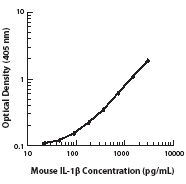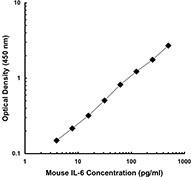- Clone
- Poly5158 (See other available formats)
- Regulatory Status
- RUO
- Other Names
- Interleukin-1β, Catabolin, Hematopoietin-1 (H1), IFNβ-inducing factor, Interleukin-β, Osteoclast activating factor (OAF)
- Isotype
- Goat Polyclonal IgG
- Ave. Rating
- Submit a Review
- Product Citations
- publications
| Cat # | Size | Price | Quantity Check Availability | Save | ||
|---|---|---|---|---|---|---|
| 515801 | 60 µg | 300€ | ||||
IL-1 refers to two proteins, IL-1α and IL-1β which are the products of distinct genes, but which are recognized by the same cell surface receptors. IL-1β is a potent immuno-modulator which mediates a wide range of immune and inflammatory responses including the activation of B and T cells. The Poly5158 antibody reacts with the precursor and mature secreted forms of mouse IL-1β.
Product DetailsProduct Details
- Verified Reactivity
- Mouse
- Antibody Type
- Polyclonal
- Host Species
- Goat
- Immunogen
- Recombinant mouse IL-1β
- Formulation
- Phosphate-buffered solution, pH 7.2, containing 0.09% sodium azide and BSA (origin USA).
- Preparation
- The antibody was purified by affinity chromatography, and conjugated with biotin under optimal conditions.
- Concentration
- 0.2 mg/mL
- Storage & Handling
- The antibody solution should be stored undiluted between 2°C and 8°C. Do not freeze.
- Application
-
ELISA Detection - Quality tested
- Recommended Usage
-
Each lot of this antibody is quality control tested by ELISA assay. For ELISA detection, the suggested use of this reagent is 1:200 dilution. To obtain a linear standard curve, serial dilutions of IL-1β recombinant protein ranging from 2000 to 30 pg/ml are recommended for each ELISA plate. It is recommended that the reagent be titrated for optimal performance for each application.
- Application Notes
-
ELISA Detection: The biotinylated Poly5158 antibody is useful as a detection antibody for a sandwich ELISA assay, when used in conjunction with purified B122 antibody (Cat. No. 503502) as the capture antibody.
- Additional Product Notes
-
This antibody can be used for 5 plates.
- Product Citations
-
- RRID
-
AB_2124615 (BioLegend Cat. No. 515801)
Antigen Details
- Structure
- Cytokine; 17.5 kD (Mammalian)
- Bioactivity
- Stimulates T cells, B cells, proliferation/activation of NK cells, fibroblasts, thymocytes, glioblastoma cells, astroglia, microglia; monocyte transition from IL-1β to IL-1α when matured to macrophages
- Cell Sources
- Monocytes, tissue macrophages, Langerhan cells, dendritic cells, T lymphocytes, B lymphocytes, natural killer (NK) cells, large granular lymphocytes (LGL), vascular endothelium, smooth muscle, fibroblasts, thymic epithelia, astrocytes, microglia, glioma
- Cell Targets
- B cells, T cells, monocytes
- Receptors
- Type I IL-1R (CDw121a), Type II IL-1R (CDw121b)
- Biology Area
- Cell Biology, Immunology, Innate Immunity, Neuroinflammation, Neuroscience
- Molecular Family
- Cytokines/Chemokines
- Antigen References
-
1. Fitzgerald K, et al. Eds. 2001. The Cytokine FactsBook. Academic Press San Diego.
2. Bomford R, et al. Eds. 1989. Interleukin-1 inflammation and disease. Elsevier New York.
3. Brazel D, et al. 1991. Biotechnol. Ther. 2:241.
4. Dinarello C et al. 1996. Blood 87:2095. - Regulation
- Upregulated by TNF-α, IFN-α, IFN-β, IFN-γ, bacterial endotoxins, viruses, mitogens, antigens; downregulated by IL-6, lipoproteins, lipids, and α2-macroglobulin
- Gene ID
- 3553 View all products for this Gene ID
- Specificity (DOES NOT SHOW ON TDS):
- IL-1beta
- Specificity Alt (DOES NOT SHOW ON TDS):
- IL-1β
- App Abbreviation (DOES NOT SHOW ON TDS):
- ELISA Detection
- UniProt
- View information about IL-1beta on UniProt.org
Related FAQs
- How many biotin molecules are per antibody structure?
- We don't routinely measure the number of biotins with our antibody products but the number of biotin molecules range from 3-6 molecules per antibody.
Other Formats
View All IL-1β Reagents Request Custom Conjugation| Description | Clone | Applications |
|---|---|---|
| Biotin anti-mouse IL-1β | Poly5158 | ELISA Detection |
| LEAF™ Purified anti-mouse IL-1β | Poly5158 | Neut |
Customers Also Purchased
Compare Data Across All Formats
This data display is provided for general comparisons between formats.
Your actual data may vary due to variations in samples, target cells, instruments and their settings, staining conditions, and other factors.
If you need assistance with selecting the best format contact our expert technical support team.
-
Biotin anti-mouse IL-1β
-
LEAF™ Purified anti-mouse IL-1β

Recombinant mouse IL-1β (Cat. No. 575102) (black circles) in...
 Login / Register
Login / Register 















Follow Us